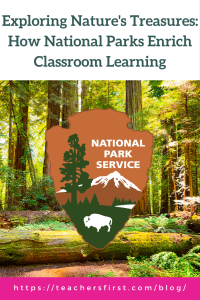“Study nature, love nature, stay close to nature. It will never fail you.”
Frank Lloyd Wright
As educators, we strive to create engaging and impactful learning experiences for our students that connects them to the real world. While classroom instruction plays a crucial role, the world beyond the school walls offers invaluable opportunities for growth and inspiration! With their breathtaking landscapes and diverse ecosystems, national parks are ideal settings to foster a deeper connection to nature and learning. This blog post discusses how incorporating national parks into the classroom can enrich student learning.
Virtual Park Tours
National parks are teeming with historical significance and fascinating wildlife. Unfortunately, not all students have had experiences exploring these places of natural wonder. That’s why leveraging a virtual park tour can significantly impact a student’s connection to nature. Educators can now lead virtual park tours from the classroom through different platforms or webinars. For example, The National Parks Conservation Association (NPCA) offers innovative ways for people to connect with and experience these national treasures. One remarkable initiative is the virtual tours they provide, allowing us to explore the beauty of these parks from the comfort of our homes or, in this case, our classrooms! Furthermore, Google Earth has many 360 tours of national parks in North America.
Digital Storytelling and Podcasting
An extension activity that can be added to any national parks research or virtual tours is to encourage students to create digital stories or podcasts about their favorite national parks or parks that they’ve learned about and would be interested in visiting. On our TeachersFirst website, you can find a collection of suggested podcast creators.
Citizen Science
Contributing to citizen science projects within national parks offers students a unique opportunity to actively engage in scientific research and conservation efforts. By participating in these investigations, students can witness firsthand the significance of data collection and analysis in the scientific process. This website provides a comprehensive list of citizen science projects sponsored by different national parks. Additionally, students can take the initiative to design and conduct their own projects, utilizing resources like Citizenscience.gov or platforms like iNaturalist (reviewed here) to explore their curiosity and make meaningful contributions to the field of science. By participating in citizen science, students become active stewards of nature, embracing their role in safeguarding the natural heritage within our national parks.
Discovering Forest Bathing
Forest bathing, also known as Shinrin-yoku in Japanese, is the art of immersing oneself in the natural environment’s sights, sounds, and scents to achieve a state of mindfulness and rejuvenation. Studies have shown that spending time in nature reduces stress, boosts creativity, and improves overall well-being. Educators can help students develop a sense of mindfulness and empathy for nature by introducing the concept of forest bathing in the classroom. Learn more about forest bathing and how to start this practice in your classroom by visiting this site.
Bringing national parks into the classroom through technology opens up a world of educational possibilities and opportunities for all students! By utilizing virtual park tours, and digital storytelling, educators can spark students’ interest and create environmentally-conscious learners! Share in the comments ways you have brought national parks into your classroom!


